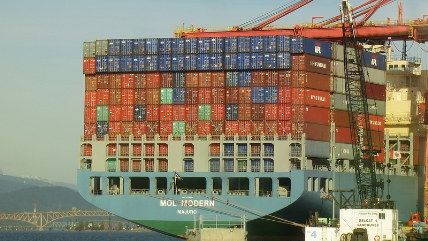Study Attempts to Show Exactly How Trump's Trade Wars Devastate the Poor
How to erase billions from the American economy.


Donald Trump's populist-fueled ignorance about how world trade works makes economists tear out their own hair. He thinks trade deficits between the United States and other countries mean we're somehow getting screwed over and not the actual reality that we're buying goods that we want more cheaply. You have a trade deficit with your local grocery store, but you're not getting screwed over by them (well, maybe on that overpriced Greek yogurt).
But politicians have to take the blame, too. Trump is far from the first candidate for office in either party promising to "bring jobs back" from overseas through either incentives or punishments or some combination. Regardless, economists have been trying to break through the trade ignorance of the election cycle, without much success. For those who feel like they've stagnated in the current economy (even if we're able to buy more and better things with the same amount of money), it's tough to buy the argument that the country is actually better off.
The analysts at the National Foundation for American Policy (NFAP), a nonpartisan, nonprofit free market-oriented think tank, released a new report with an attempt to put a price tag on how much harm Trump's proposed trade wars would cause to Americans, particularly the poor.
They are taking Trump at his word that he wants to impose tariffs on Mexico, China, and possibly even Japan in order to try to push lost jobs and manufacturing back into the United States. The first thing NFAP notes in this study is that history shows that these kind of targeted tariffs don't work to bring jobs back. In previous examples of the United States increasing duties on selected goods from selected countries, we ended up getting more imports from other countries that weren't hit with the increased costs. It was still cheaper to get the products elsewhere even when we punished specific countries.
If Trump were somehow able to make the tariffs "effective" and prevent alternative imports, report writers David G. Tuerck, Paul Bachman, and Frank Conte say the tariffs would have the impact of an $11,000 consumption tax over five years for the average American household. And it's regressive. They predict it would hit poor people the most, consuming 18 percent of the after-tax income of those in the lowest 10 percent of incomes in the United States.
If Trump were to go so far as to introduce tariffs against all countries in order to really try to force those lost jobs back into the United States, it would end up costing consumers $760 billion annually in increased prices, but the benefits to producers and to the government in tariff revenues would total only $301 billion. That leaves a "dead loss" of $459 billion. If Trump were to introduce this all-in plan, the increased costs would consume 53 percent of the after-tax income of the poorest 10 percent. If we move up to the middle levels of incomes, it would still consume an additional 13 percent of after-tax incomes.
The report is not blind to the economic realities that have helped Trump's arguments. It is aware that yes, some American workers have been pushed out of careers due to trade, and these are typically low-wage workers in low-skill jobs that have been displaced by other countries able to do the work more cheaply. The report notes that these "low-wage workers … find that their already poor circumstances get even worse. These are the workers to whom Trump is appealing."
That's why the focus on how the tariffs would hurt the poorest sectors of the American economy is so important. That huge gap that the report calculates between what Americans would pay in higher prices versus the domestic benefits for manufacturers and government revenue shows that it can't simply be reversed and that things can just go back to the "way they were." Those jobs are probably not coming back, not to the extent that they once existed. Whatever the solutions may be out there to helping our poorest, least-skilled workers, Trump's trade wars won't help them any more than massive increases in the minimum wage will. The report concludes:
"In any event, it turns out that the worst thing that could happen to low-income Americans is for the Trump tariffs to work. We find that the proposed tariffs against China, Japan and Mexico would impose what amounts to 18% additional tax on the poorest 10% of U.S. households and 6% on the next poorest. The richest 10% would be the least affected American income earners. The U.S. economy would suffer a total burden in the form of a $278 billion loss in household purchasing power – akin to a general 3.9% new tax on after-tax income. On the plus side, a small portion of this burden would be redistributed to U.S. producers, who would benefit from the new tariffs. But that leaves a dead loss of $170 billion of consumer income that would simply vanish owing to the distortions in the price system created by the tariffs. And, on the negative side, it is not clear that a substantial new tax on household income would simply transfer purchasing power from consumers to beleaguered workers. Our analysis assumes that prices would rise by the amount of the tariff. Nominal wages might fall, with predictable negative effects on labor participation."
Read through the report here. Politico also made note of the study here.


Show Comments (194)